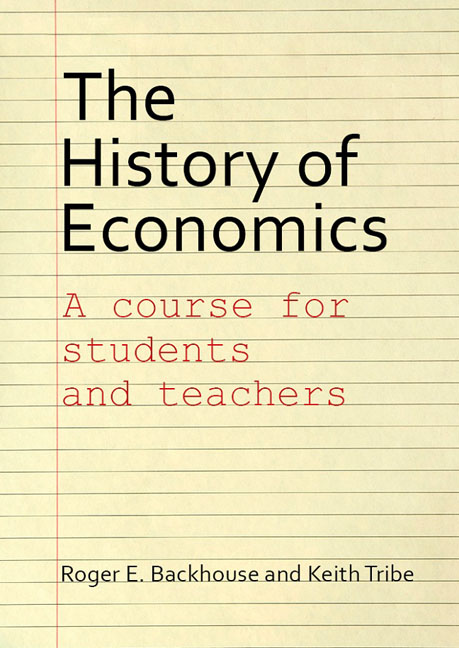Book contents
- Frontmatter
- Contents
- Introduction
- Lecture 1 Commerce, Wealth and Power: The Disputed Foundations of the Strength of a Nation
- Lecture 2 Natural Order, Physiocracy and Reform
- Lecture 3 Adam Smith I: Outline of a Project
- Lecture 4 Adam Smith II: The Two Texts
- Lecture 5 The Political Economy of Malthus and Ricardo
- Lecture 6 Political Economy in Continental Europe and the United States
- Lecture 7 Political Economy, Philosophic Radicalism and John Stuart Mill
- Lecture 8 Popular Political Economy: List, Carey, Bastiat and George
- Lecture 9 Radical Political Economy: Marx and His Sources
- Lecture 10 Marginalism and Subjectivism: Jevons and Edgeworth
- Lecture 11 From Political Economy to Economics
- Lecture 12 Alfred Marshall’s Project
- Lecture 13 Markets and Welfare after Marshall
- Lecture 14 Monetary Economics
- Lecture 15 The Rise of Mathematical Economics
- Lecture 16 Robbins’s Essay and the Definition of Economics
- Lecture 17 John Maynard Keynes
- Lecture 18 Quantitative Economics
- Lecture 19 The Keynesian Revolution
- Lecture 20 Modern Macroeconomics
- Lecture 21 Inflation and the Phillips Curve
- Lecture 22 Popular Economics
- Lecture 23 Economics and Policy
- Lecture 24 Ideology and Place
- Index
Lecture 19 - The Keynesian Revolution
Published online by Cambridge University Press: 09 August 2023
- Frontmatter
- Contents
- Introduction
- Lecture 1 Commerce, Wealth and Power: The Disputed Foundations of the Strength of a Nation
- Lecture 2 Natural Order, Physiocracy and Reform
- Lecture 3 Adam Smith I: Outline of a Project
- Lecture 4 Adam Smith II: The Two Texts
- Lecture 5 The Political Economy of Malthus and Ricardo
- Lecture 6 Political Economy in Continental Europe and the United States
- Lecture 7 Political Economy, Philosophic Radicalism and John Stuart Mill
- Lecture 8 Popular Political Economy: List, Carey, Bastiat and George
- Lecture 9 Radical Political Economy: Marx and His Sources
- Lecture 10 Marginalism and Subjectivism: Jevons and Edgeworth
- Lecture 11 From Political Economy to Economics
- Lecture 12 Alfred Marshall’s Project
- Lecture 13 Markets and Welfare after Marshall
- Lecture 14 Monetary Economics
- Lecture 15 The Rise of Mathematical Economics
- Lecture 16 Robbins’s Essay and the Definition of Economics
- Lecture 17 John Maynard Keynes
- Lecture 18 Quantitative Economics
- Lecture 19 The Keynesian Revolution
- Lecture 20 Modern Macroeconomics
- Lecture 21 Inflation and the Phillips Curve
- Lecture 22 Popular Economics
- Lecture 23 Economics and Policy
- Lecture 24 Ideology and Place
- Index
Summary
Aims of the lecture
1. To explain how the way economists thought about macroeconomic problems changed in the decade after The General Theory.
2. To show that this question is not the same as assessing what was novel about The General Theory, or what Keynes believed he was doing, and that insofar as Keynes’s book had a big effect, this may have been due to other factors operating at the same time.
3. To point out the complexity of the phenomenon known as the Keynesian revolution.
Bibliography
D. Laidler’s Fabricating the Keynesian Revolution: Studies of the Interwar Literature on Money, the Cycle and Unemployment (Cambridge: Cambridge University Press, 1999) makes the argument that the Keynesian revolution gave economists a model (IS-LM) that summed up key points that had been developed in the preceding years. It is the best available, and most thorough, account of macroeconomic problems in the interwar period.
R. E. Backhouse and D. Laidler’s “What Was Lost with ISLM?” in The IS-LM Model: Its Rise, Fall, and Strange Persistence, M. De Vroey and K. D. Hoover (eds), Annual Supplement to History of Political Economy 36 (Durham, NC: Duke University Press, 2004), argues that important ideas, mostly connected with the role of time, were lost with IS-LM, and hence as a result of the Keynesian revolution. As the volume’s title implies, it contains other papers on the history of the IS-LM model. W. Young’s Interpreting Mr. Keynes (Boulder, CO: Westview, 1987) gives an account of the early history of the IS-LM model.
Different perspectives on the Keynesian revolution are given in the following references: R. E. Backhouse and B. W. Bateman (eds), The Cambridge Companion to Keynes (Cambridge: Cambridge University Press, 2006), which includes chapters by R. E. Backhouse, “The Keynesian Revolution”, D. Laidler, “Keynes and the Birth of Modern Macroeconomics”, and B. W. Bateman, “Keynes and Keynesianism”; and D. Laidler’s “The Keynesian Revolution” and R. E. Backhouse and B. W. Bateman’s “Keynesianism”, both of which appear in The New Palgrave Dictionary of Economics, second edition (London: Macmillan, 2008), available online at www.dictionaryofeconomics.com.
- Type
- Chapter
- Information
- The History of EconomicsA Course for Students and Teachers, pp. 289 - 302Publisher: Agenda PublishingPrint publication year: 2017



